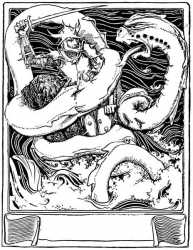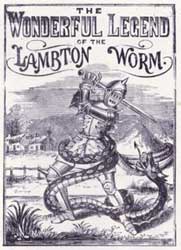Lambton Worm
In Durham folklore, a huge worm that wreaked havoc during the Middle Ages. The legend is told by Robert Surtees in History of Durham:
"The heir of Lambton, fishing, as was his profane custom, in the Wear of a Sunday, hooked a small worm or eft, which he carelessly threw into a well, and thought no more of the adventure. The worm, at first neglected, grew till it was too large for its first habitation, and issuing forth from the Worm Well, betook itself to the river, where it usually lay a part of the day coiled round a crag in the middle of the water; it also frequented a green mound near the well, the Worm Hill, where it lapped itself nine times round, leaving vermicular traces, of which grave living witnesses depose that they have seen the vestiges. It now became the terror of the country; and, amongst other enormities, levied a daily contribution of nine cows' milk, which was always placed for it at the Green Hill, and in default of which it devoured man and beast.
"Young Lambton had, it seems, meanwhile, totally repented him of his former life and conversation, had bathed himself in a bath of holy water, taken the sign of the Cross, and joined the Crusaders. On his return home he was extremely shocked at witnessing the effects of his youthful imprudence, and immediately undertook to exterminate the worm. After several fierce combats, in which the crusader was foiled by his enemy's power of self-union, he found it expedient to add policy to courage, and not possessing much of the former quality, he went to consult a witch, or wise woman. By her judicious advice, he armed himself in a coat of mail, studded with razor-blades, and thus prepared, placed himself on the crag in the river, and awaited the monster's arrival. At the usual time, the Worm came to the rock, and wound himself with great fury round the armed knight, who had the satisfaction to see his enemy cut in pieces by his own efforts, while the stream washing away the several parts prevented the possibility of re-union.
"There is still a sequel to the story. The witch had promised Lambton success only on one condition — that he would slay the first living thing which met his sight after the victory. To avoid the possibility of human slaughter, Lambton had directed his father, that as soon as he heard him sound three blasts on his bugle, in token of achievement performed, he should release his favourite greyhound, which would immediately fly to the horn, and was destined to be the sacrifice. On hearing his son's bugle, however, the old chief was so overjoyed that he forgot his injunctions, and ran himself with open arms to meet his son. Instead of committing a parricide, the conqueror again repaired to his adviser, who pronounced, as the alternative of disobeying the original instructions, that no chief of the Lambtons should die in his bed for seven, or, as some accounts say, for nine generations — a commutation which, to a martial spirit, had nothing,probably, very terrible, and which was willingly complied with."
❧
References
Source
- Omens and Superstitions: Curious facts and illustrative sketches. (1868). Edinburgh: William P. Nimmo, pp. 60-61.

